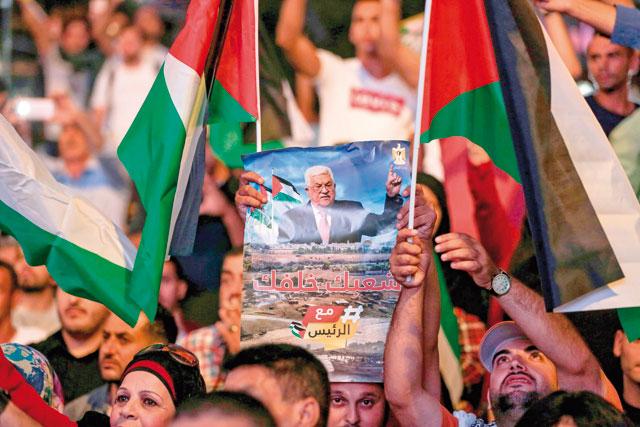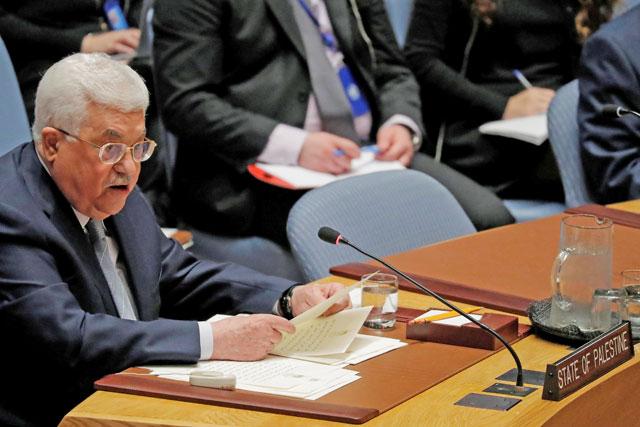You are here
Abbas rejects ‘biased’ US as sole Mideast mediator
By AFP - Sep 28,2018 - Last updated at Sep 28,2018

Palestinians wave Palestinian flags and photo of President Mahmoud Abbas during a demonstration in a square in the West Bank city of Ramallah, ahead of his speech during the 73rd Session of the UN General Assembly in New York, on Thursday (AFP photo)
UNITED NATIONS, United States — Palestinian leader Mahmud Abbas tore into the Trump administration Thursday, refusing to accept the United States as the sole mediator in the Middle East conflict, a day after Donald Trump promised a "very fair" peace plan.
The 82-year-old Palestinian Authority president used his address to the UN General Assembly to lambast the United States for closing the Palestine Liberation Organisation office in Washington, recognising Jerusalem as the capital of Israel, moving its embassy and slashing Palestinian aid money.
Speaking one day after the US president said he favoured a two-state solution to end the Israeli-Palestinian conflict and vowed to unveil a new peace plan within months, Abbas said Trump could not be regarded as a neutral broker.
"We will also not accept sole American mediation in the peace process," he said, accusing the former real estate tycoon of being "biased" towards Israel since taking office in January 2017.
"With all of these decisions, this administration has reneged on all previous US commitments, and even undermined the two-state solution," Abbas told the world body in a nearly 40-minute speech.
"It's really ironic that the American administration still talks about what they call the 'deal of the century”.
"But what is left for this administration to give to the Palestinian people? Only humanitarian solutions?"
Palestinian leaders have long seen President Donald Trump's administration as blatantly biased in favour of Israel and seeking to blackmail them into accepting their terms.
The Palestinian leadership cut off contact with the White House after Trump recognised Jerusalem as Israel's capital last December and the United States has also cut more than $500 million in Palestinian aid.
“From this august platform, I renew my call to President Trump to rescind his decisions and decrees... in order to salvage the prospects for peace and to achieve stability and security for future generations,” Abbas said.
Extend our hands for peace
Last February, Abbas called for an international conference to relaunch the peace process under a new mediator to replace the United States, in an address to the UN Security Council.
On Thursday, he said there could be no peace without an independent Palestinian state with East Jerusalem as its capital, calling on countries around the world to recognise the state of Palestine.
“We are not against negotiations,” the Palestinian leader added. “We will continue to extend our hands for peace.”
At the United Nations on Wednesday, Trump pledged to unveil a new Middle East peace plan by the end of the year, turning heads by supporting for the first time a two-state solution to the conflict.
When meeting Israeli Prime Minister Benjamin Netanyahu on the sidelines of the UN General Assembly, Trump said he backed a two-state solution since “that’s what I think works best, that’s my feeling”.
His endorsement of the goal of a Palestinian state, long the focus of US peace efforts before he came into office, was decidedly lukewarm — and he even slightly backtracked from it later in the day.
“If the Israelis and the Palestinians want one state, that’s OK with me,” he later told a news conference. “If they want two states, that’s OK with me. I’m happy if they’re happy.”
But it sparked concern among some Israeli right-wing politicians who hoped Trump would bury the idea of Palestinian statehood once and for all, while Palestinian officials dismissed his comments as empty talk.
Trump’s son-in-law and aide Jared Kushner is part of a team working on the portfolio, whose efforts have been met with derision from the Palestinians, who note that Israel has so far not been asked publicly for any concessions in return for the Jerusalem recognition and other moves they favour.
Israeli Prime Minister Benjamin Netanyahu is expected to address the UN General Assembly later on Thursday, in a speech likely to focused on Israel’s main enemy Iran, particularly its presence in neighbouring Syria.
Related Articles
RAMALLAH, Palestinian Territories — Palestinian leaders met Monday to plan a response to what they see as US President Donald Trump's attack
UNITED NATIONS, USA — Palestinian President Mahmud Abbas has invited Middle East envoys, foreign ministers and Security Council diplomats to
UNITED NATIONS, United States — Palestinian President Mahmoud Abbas on Tuesday called for an international conference to be held by mid-2018


















